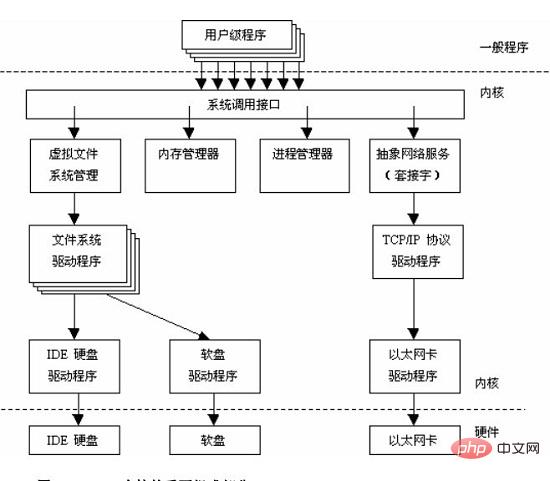What is the structure of linux
Jun 22, 2022 pm 05:23 PMThe structure of the Linux system is divided into four parts: 1. Kernel, the core of the operating system is responsible for managing the system's processes, memory, device drivers, etc.; 2. Shell, the user interface of the system, provides the connection between the user and the kernel An interface for interactive operations; 3. File system, a method of organizing files stored on storage devices such as disks; 4. Applications, including assembly of text editors and programming languages.

#The operating environment of this tutorial: linux7.3 system, Dell G3 computer.
What is the structure of Linux
Linux systems generally have 4 main parts: kernel, shell, file system and applications. The kernel, shell, and file system together form the basic operating system structure that allows users to run programs, manage files, and use the system.
Kernel
The kernel is the core of the operating system and has many of the most basic functions. It is responsible for managing the system's processes, memory, and device drivers. , file and network systems, determine the performance and stability of the system.
The Linux kernel consists of the following parts: memory management, process management, device drivers, file system and network management, etc. As shown in the figure:

# System call interface: The SCI layer provides certain mechanisms to perform function calls from user space to the kernel. This interface is architecture dependent, even within the same processor family. SCI is actually a very useful function call multiplexing and demultiplexing service. You can find the implementation of SCI in ./linux/kernel and the architecture-dependent parts in ./linux/arch.
Linux Shell
Shell is the user interface of the system, providing an interface for users to interact with the kernel. It receives commands entered by the user and sends them to the kernel for execution. It is a command interpreter. In addition, the shell programming language has many characteristics of ordinary programming languages. Shell programs written in this programming language have the same effect as other applications.
Currently there are mainly the following versions of shell.
1. Bourne Shell: Developed by Bell Labs.
2. BASH: It is GNU's Bourne Again Shell. It is the default shell on the GNU operating system. Most Linux distribution packages use this shell.
3. Korn Shell: It is a development of Bourne SHell and is compatible with Bourne Shell in most aspects.
4. C Shell: It is the BSD version of SUN Company Shell.
linux file system
The file system is an organization method for files stored on storage devices such as disks. Linux systems can support a variety of currently popular file systems, such as EXT2, EXT3, FAT, FAT32, VFAT and ISO9660.
linux application
The standard Linux system generally has a set of programs called applications, which includes text editors, Programming languages, X Window, office suites, Internet tools and databases, etc.
Recommended learning: Linux video tutorial
The above is the detailed content of What is the structure of linux. For more information, please follow other related articles on the PHP Chinese website!

Hot Article

Hot tools Tags

Hot Article

Hot Article Tags

Notepad++7.3.1
Easy-to-use and free code editor

SublimeText3 Chinese version
Chinese version, very easy to use

Zend Studio 13.0.1
Powerful PHP integrated development environment

Dreamweaver CS6
Visual web development tools

SublimeText3 Mac version
God-level code editing software (SublimeText3)

Hot Topics
 deepseek web version entrance deepseek official website entrance
Feb 19, 2025 pm 04:54 PM
deepseek web version entrance deepseek official website entrance
Feb 19, 2025 pm 04:54 PM
deepseek web version entrance deepseek official website entrance
 Android TV Box gets unofficial Ubuntu 24.04 upgrade
Sep 05, 2024 am 06:33 AM
Android TV Box gets unofficial Ubuntu 24.04 upgrade
Sep 05, 2024 am 06:33 AM
Android TV Box gets unofficial Ubuntu 24.04 upgrade
 BitPie Bitpie wallet app download address
Sep 10, 2024 pm 12:10 PM
BitPie Bitpie wallet app download address
Sep 10, 2024 pm 12:10 PM
BitPie Bitpie wallet app download address
 BITGet official website installation (2025 beginner's guide)
Feb 21, 2025 pm 08:42 PM
BITGet official website installation (2025 beginner's guide)
Feb 21, 2025 pm 08:42 PM
BITGet official website installation (2025 beginner's guide)
 Zabbix 3.4 Source code compilation installation
Sep 04, 2024 am 07:32 AM
Zabbix 3.4 Source code compilation installation
Sep 04, 2024 am 07:32 AM
Zabbix 3.4 Source code compilation installation
 Detailed explanation: Shell script variable judgment parameter command
Sep 02, 2024 pm 03:25 PM
Detailed explanation: Shell script variable judgment parameter command
Sep 02, 2024 pm 03:25 PM
Detailed explanation: Shell script variable judgment parameter command
 Ouyi okx installation package is directly included
Feb 21, 2025 pm 08:00 PM
Ouyi okx installation package is directly included
Feb 21, 2025 pm 08:00 PM
Ouyi okx installation package is directly included








